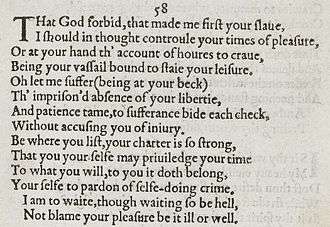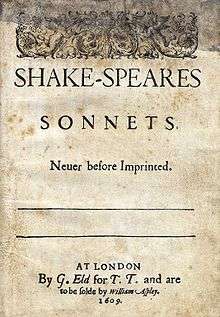Sonnet 58
Shakespeare's Sonnet 58 is a syntactic and thematic continuation of Sonnet 57. More generally, it belongs to the large group of sonnets written to a young, aristocratic man, with whom the poem's speaker shares a tempestuous relationship. In this poem, the speaker complains of the beloved's voluntary absence, using the occasion to outline a more general lament against his own powerlessness and the indifference of the young man.
| Sonnet 58 | |||||||
|---|---|---|---|---|---|---|---|
 Sonnet 58 in the 1609 Quarto | |||||||
| |||||||
Structure
Sonnet 58 is an English or Shakespearean sonnet. The Shakespearean sonnet contains three quatrains followed by a final rhyming couplet. It follows the form's typical rhyme scheme, ABAB CDCD EFEF GG, and is written a type of poetic metre called iambic pentameter based on five pairs of metrically weak/strong syllabic positions. The first line exemplifies a regular iambic pentameter; the second adds a final extrametrical syllable or feminine ending:
× / × / × / × / × / That God forbid, that made me first your slave, × / × / × / × / × / (×) I should in thought control your times of pleasure, (58.1-2)
- / = ictus, a metrically strong syllabic position. × = nonictus. (×) = extrametrical syllable.
The meter demands a few variant pronunciations. Lines three and six require the contraction of "the" and the ensuing word: "th'account" (two syllables) and "th'imprisoned" (three syllables). In line three "hours" is one syllable, and in line seven "sufferance" is two.
Source and analysis
Line 6 is obscure. Nicolaus Delius glosses it "Let me bear the fact that the liberty you possess is wanting to me, a captive." While recognizing that Delius might be correct, Edward Dowden suggests "The separation from you, which is proper to your state of freedom, but which to me is imprisonment."
In line 9, the quarto's comma after tame is generally removed; editors have glossed the phrase "tame to sufferance" as "made tame to fortune's blows" (Malone); "bearing tamely even cruel distress" (Dowden); "complaisant in suffering" (Sidney Lee}; and "subdued so as to suffer" (Beeching).
In the nineteenth century, there was some debate as to whether this sonnet and Sonnet 57 were addressed to a man or a woman. The tone of querulous anger and the use of some sonnet conventions (such as the conceit of servitude) were sometimes seen as inappropriate for a poem addressed to a social superior and a man. Others, principally those who wished to fit the sonnets into a biographical narrative, accepted that the poems were addressed to a man, and often had a specific man in mind, whether Southampton or someone else. Thomas Tyler, for instance, noted thematic and verbal parallels between these sonnets and some letters of Pembroke. The latter identification has received scant acceptance.
Modern critics accept that the poems were addressed to a young man, and they view the language of class in the sequence from 56–59 in terms of a complex dynamic of class difference and desire. The speaker's metaphoric description of love as enslavement is complicated and enriched by the fact that here, the speaker is literally as well as figuratively subordinate to the beloved. For Helen Vendler and Stephen Booth, among others, the rhetoric of enslavement is ironic: it highlights the element of exaggeration in the speaker's rhetoric, thus hinting that those emotions spring more from self-pity than from justified hurt. Other critics agree to the complexity without admitting that it is ironic. David Shallwyck asserts that the sonnet "accomplishes the remarkable feat of simultaneously offering an apology and levelling an accusation."
Notes
- Pooler, C[harles] Knox, ed. (1918). The Works of Shakespeare: Sonnets. The Arden Shakespeare [1st series]. London: Methuen & Company. OCLC 4770201.
References
- Baldwin, T. W. On the Literary Genetics of Shakespeare's Sonnets. Urbana: University of Illinois Press, 1950.
- Schallwyck, David. Speech and Performance in Shakespeare's Plays and Sonnets. Cambridge: Cambridge University Press, 2002.
- First edition and facsimile
- Shakespeare, William (1609). Shake-speares Sonnets: Never Before Imprinted. London: Thomas Thorpe.CS1 maint: ref=harv (link)
- Lee, Sidney, ed. (1905). Shakespeares Sonnets: Being a reproduction in facsimile of the first edition. Oxford: Clarendon Press. OCLC 458829162.
- Variorum editions
- Alden, Raymond Macdonald, ed. (1916). The Sonnets of Shakespeare. Boston: Houghton Mifflin Company. OCLC 234756.
- Rollins, Hyder Edward, ed. (1944). A New Variorum Edition of Shakespeare: The Sonnets [2 Volumes]. Philadelphia: J. B. Lippincott & Co. OCLC 6028485.
- Modern critical editions
- Atkins, Carl D., ed. (2007). Shakespeare's Sonnets: With Three Hundred Years of Commentary. Madison: Fairleigh Dickinson University Press. ISBN 978-0-8386-4163-7. OCLC 86090499.
- Booth, Stephen, ed. (2000) [1st ed. 1977]. Shakespeare's Sonnets (Rev. ed.). New Haven: Yale Nota Bene. ISBN 0-300-01959-9. OCLC 2968040.
- Burrow, Colin, ed. (2002). The Complete Sonnets and Poems. The Oxford Shakespeare. Oxford: Oxford University Press. ISBN 978-0192819338. OCLC 48532938.
- Duncan-Jones, Katherine, ed. (2010) [1st ed. 1997]. Shakespeare's Sonnets. The Arden Shakespeare, Third Series (Rev. ed.). London: Bloomsbury. ISBN 978-1-4080-1797-5. OCLC 755065951.
- Evans, G. Blakemore, ed. (1996). The Sonnets. The New Cambridge Shakespeare. Cambridge: Cambridge University Press. ISBN 978-0521294034. OCLC 32272082.
- Kerrigan, John, ed. (1995) [1st ed. 1986]. The Sonnets ; and, A Lover's Complaint. New Penguin Shakespeare (Rev. ed.). Penguin Books. ISBN 0-14-070732-8. OCLC 15018446.
- Mowat, Barbara A.; Werstine, Paul, eds. (2006). Shakespeare's Sonnets & Poems. Folger Shakespeare Library. New York: Washington Square Press. ISBN 978-0743273282. OCLC 64594469.
- Orgel, Stephen, ed. (2001). The Sonnets. The Pelican Shakespeare (Rev. ed.). New York: Penguin Books. ISBN 978-0140714531. OCLC 46683809.
- Vendler, Helen, ed. (1997). The Art of Shakespeare's Sonnets. Cambridge, MA: The Belknap Press of Harvard University Press. ISBN 0-674-63712-7. OCLC 36806589.
.png)
